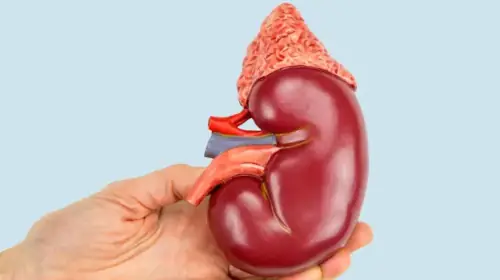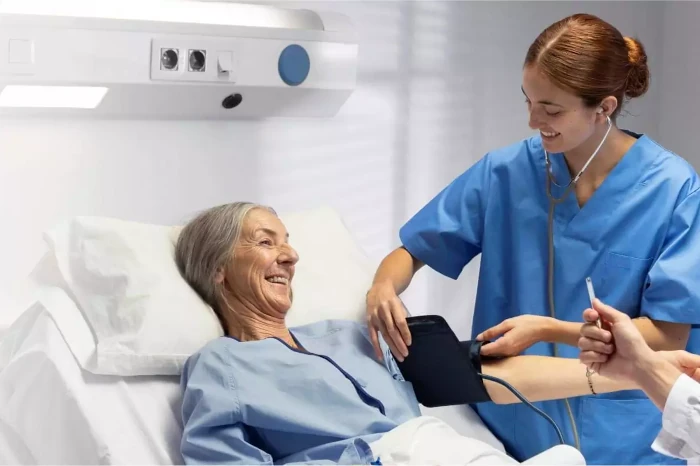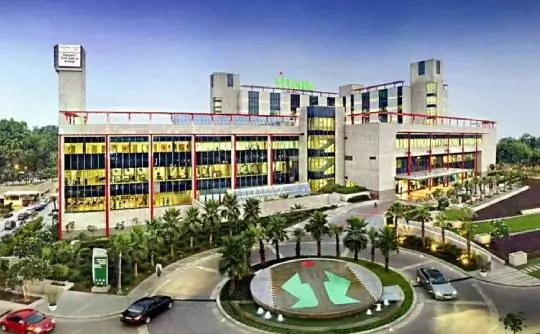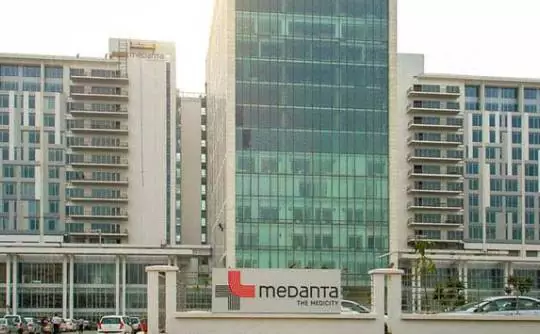

A significant cost to consider when planning a kidney transplant in India is the surgeon's fee. IndiCure Health Tours connects you with board-certified surgeons in India who are highly experienced and have a proven track record of successful transplant surgeries. Although the surgeon's fee may vary depending on their experience and reputation, you can rely on IndiCure to recommend professionals who prioritize your safety and ensure excellent results for your kidney transplant surgery in India.
In an effort to enhance patient care, new techniques and technologies are frequently incorporated into the surgical process in India. However, these innovative advancements can lead to an increase in the final kidney transplant cost in India.
Choosing an accredited surgical facility with skilled and qualified medical staff is crucial for the success of a kidney transplant in India. In India, larger cities like Mumbai and Delhi typically offer superior medical facilities and more experienced surgeons, resulting in higher costs. IndiCure Health Tours specifically recommends surgical facilities in larger cities of India to prioritize quality of care and ensure patient safety.
Surgery-related costs include both pre-and post-operative expenses. Pre-operative costs are influenced by factors such as the patient's age and medical condition, determining the necessity and type of investigations needed. Post-operative expenses may involve prescribed medications and subsequent follow-up appointments.
At IndiCure Health Tours, we streamline the majority of expenses for your kidney transplant in India, offering an all-inclusive and budget-friendly package that is customized to your specific needs and financial requirements. Once we receive your medical reports, your dedicated case manager will provide an estimated kidney transplant cost in India based on discussions with the surgeon.
The final cost of the kidney transplant in India, however, will be confirmed after your in-person consultation with the surgeon in India.

We Help you Choose the Right Treatment, Surgeon & Hospital

We Arrange Video/Telephonic Consultation with the Surgeon

We Assist you with Visa & Accommodation

We Receive you at the Airport and Drop you at Hotel/Hospital

We Assist you the at Hospital & Provide Post Operative Support
IndiCure Health Tours offers exclusive savings on your medical travel to India. We choose partner with the best hospitals in India to negotiate special rates. This ensures that you get the best possible price on your healthcare when you plan your medical travel with us.

Here is a set of questions you should consider asking before commencing your medical tour for a kidney transplant surgery in India.
Prepare to answer questions about your:
Kidney transplant also called kidney/renal transplantation is a complex and major surgical procedure. With advanced innovations in surgical technologies, kidney transplants in India are safe and yield good outcomes.
For a transplant, a kidney can either be taken from a living donor who is willing to donate one kidney to the patient, or from a dead person or cadaver. However, due to the long waiting time for the kidneys from cadavers, patients usually opt for a live donor transplant.
NOTE: IT IS IMPORTANT TO NOTE THAT INDICURE DOES NOT ARRANGE DONORS. THE DONOR FOR KIDNEY TRANSPLANT HAS TO BE A CLOSE RELATIVE OF THE PATIENT (SIBLING/ PARENTS/ CHILDREN/SPOUSE). IN CASE THE DONOR IS NOT A CLOSE RELATIVE, GOVERNMENT PERMISSION IS REQUIRED AND IS GIVEN ONLY IF IT IS ESTABLISHED THAT THERE IS NO COMMERCIAL TRANSACTION INVOLVED BETWEEN THE DONOR AND THE RECIPIENT.
As the latest techniques of kidney transplant are advancing, many people from around the world come for kidney transplantation in India. Owing to the low kidney transplant cost in India, highly skilled & experienced surgeons and state of art hospital facilities, India has emerged as one of the most favorable destinations for organ transplants in the world.
Kidney is one of the most vital organs of the human body that performs the important function of filtering waste from your blood and excreting that waste out of the body in the form of urine. It also assists in maintaining the body's fluid and electrolyte balance. If the kidney ceases working normally, the waste starts accumulating in the body and makes you ill. You would need a kidney transplant to replace your diseased kidney with a new, healthy kidney.
The new healthy kidney can be sourced from the living person who is willing to donate a kidney or it can be obtained from the dead person or a cadaver.
The basic principle behind a kidney transplant from a living donor is that one can lead a healthy and normal life even with one kidney which is sufficient for the normal functioning of the human body.
Kidney transplant allows the person with renal failure to lead a normal and active life and makes the person free from lifelong reliance on dialysis and associated strict schedules.
However, a kidney transplant is not suitable for every single patient with kidney failure. To determine the compatibility and the chances of a successful kidney transplant, a series of tests are performed on both the donor and the patient. The tests include blood group typing, tissue, HLA typing and cross-matching.
Several disorders can damage the kidneys eventually making your kidneys stop working completely. The main causes of kidney damage is end-stage renal disease (ESRD) and kidney failure. Kidney failure can be acute which is caused due to short-term severe illness of the kidneys or it can be chronic kidney failure, which happens as a result of long-term ailments like diabetes, high blood pressure etc.
There are certain risk factors that make people prone to kidney failure and ESRD. These include:
If you are diagnosed with ESRD or if your glomerular filtration rate, that means, the rate of filtering the waste out of the blood by your kidney is less than 15ml/min/1.73 sqm and if there is no other way of restoring the kidney functions, and if you are healthy enough to undergo surgery, you can be a good candidate for the kidney transplant surgery.
Before the transplant, the patient and the donor need to undergo a battery of tests like blood group (A, B, AB or O) and HLA (human leukocyte antigen) typing. If the HLA type of the patient matches with the donor, then it is more probable that the patient's body will not reject the kidney. Once the matching is done and the donor is identified, cross-matching of the antibodies is done to make sure that the antibodies will not attack the organ. If the cross-matching test comes back negative, that means if the patient's blood doesn't show any antibody reaction after mixing with the donor's blood then the surgeon can proceed with the transplant.
The kidney transplant surgery is a complex procedure performed under general anesthesia.
As the anesthesia effect starts, the surgeon makes an incision in the abdomen to reach the diseased kidney. The surgeon then places the donor's kidney in the abdomen by wiring the blood vessels of the kidney to the patient's arteries and veins. This starts blood flow through the newly replaced kidney.
The surgeon connects the ureters to the urinary bladder to let the patient micturate normally. Depending on the kidney disease, the surgeon will decide to leave the diseased kidney inside your body. If the diseased kidney can cause any problems, then removing them is the best option.
Once the kidney transplant procedure is completed, the surgeon will carefully close the incisions with sutures to ensure proper healing and minimize the risk of infection. Both the patient and the donor will then be closely monitored and transferred to the Intensive Care Unit (ICU) for specialized care.
You will be taken to the ICU immediately after the surgery, where you will be staying for around 24-48 hours following which you will be shifted to the transplant care unit for another 1 week.
Both you and the donor shall experience little pain and discomfort at the site of the incision, which would be relieved by medicines. You may also feel numbness due to severed nerves in the area of the incision. You will be given medications to subdue your immune system so that it does not reject the new kidney. The surgeon shall also give you antifungal, antibacterial and antiviral drugs for protection against any infection.
You need to come to India 2-3 weeks prior to the scheduled transplant to complete the pre-operative requirements and after the surgery about 7-8 weeks are required. So, a total stay of 10-11 weeks is required for a kidney transplant in India.
The results of the kidney transplant are satisfying and good. Your new kidney will clean and filter your blood normally and thus you shall get rid of dialysis after the successful kidney transplant. The life expectancy of more than 90% of patients who underwent live donor kidney transplants increase by 5 years and of 80% of patients increases by more than 10 years.

Gurgaon
Fortis Memorial Research Institute (FMRI), the flagship hospital of Fortis Healthcare, is a multi-specialty, quaternary care hospital and is counted among the best hospitals in India and the world. The hospital is considered as "Mecca of Healthcare" and a referral hospital, not only in the entire Asia Pacific but much beyond.
The hospital boasts of an enviable International faculty- the clinicians considered to be among the best doctors in the world and even specialty nurses offer nothing but the best in clinical care. The hospital has the most modern, state-of-the-art, cutting-edge technology in the hands of the most technically sound technicians, who offer clinical excellence beyond comparison.

Delhi
The Medicity is one of India's largest multi super-specialty institutes located in Gurgaon, National Capital Region (NCR-DELHI). Founded by one of the most renowned cardiac surgeons in India, Dr. Naresh Trehan, Medanta was established with the aim to provide the highest standards of medical care to patients backed by clinical research.
Spread across 43 acres, the institute includes a research center, medical and nursing school. It has 1250 beds and over 350 critical care beds with 37 operation theatres catering to over 20 specialties. Backed by the latest and most advanced technology, the institute is counted among the best medical institution in the world and attracts lots of patients from across the globe.
Yes, if you have a close related donor, who is willing to give you a kidney you can undergo kidney transplant in India, and that is legal. Organ transplant laws in India do not allow any selling or buying of organ transplant, and that is illegal and strictly prohibited.
The procedure can be performed on one or both Kidneys. Kidney transplants can be performed on persons of various ages, including babies and adults up to the age of 65.
The kidney transplant cost in India starts from US $15,000 and varies depending on different factors. These factors include the patient's medical condition, compatibility with the donor, surgeon, facility and the city where you choose to get kidney transplant in India.
The average waiting time is about 3-4 years if you are waiting for a cadaveric kidney transplant in India. This can be longer or shorter depending on the availability. We thus recommend you bring a live-related donor with you so that you can undergo a kidney transplant surgery immediately upon arrival after completion of legal and pre-operative formalities.
The cost of dialysis varies from US $25-40 depending on the facility and the city where you choose to get the dialysis done.
The legal formalities and paperwork shall be started immediately upon your arrival in India, and so would be the investigations for the donor and the recipient. It takes anywhere between 1-3 weeks for all this to be completed before you would undergo kidney transplant surgery.
The donor would stay in the hospital for 5-7 days, while the recipient would stay anywhere between 6-8 days at the hospital. Another 2-3 weeks for follow-up would be needed before you can go back. A total of 6-8 weeks is needed for you to undergo a kidney transplant in India.
You must be in good physical and mental health to donate a kidney. In general, you should be at least 18 years old and a maximum of 65 years old to donate a kidney.
Despite the fact that both options have benefits and drawbacks, research suggests that patients who have a successful kidney transplant live longer than those who receive dialysis. The most important thing is that transplant recipients report a much better quality of life than those who are on dialysis.
In addition to the procedure cost of Kidney Transplant in India, there are several other expenses you should plan for when organizing your medical trip to India. These include:
By accounting for these additional expenses along with the Kidney Transplant cost in India, you can create a comprehensive budget and ensure a smooth, comfortable recovery experience.
Make your medical trip to India even more comfortable and complete with our range of additional services, designed to take care of all your needs beyond the hospital.
Traveling abroad for medical reasons can be challenging if you are alone, but with IndiCure by your side, it doesn't have to be. With over fifteen years of experience and an exclusively curated network of India's best surgeons and top hospitals, we make your medical tour to India easier and safer. We will guide you at every step, handling all the end-to-end arrangements for your surgery, travel, and stay.
Ramandeep Dhaliwal
a month ago
I had great experience having rhinoplasty through Indicure. Dr. Ruchika from Indicure has helped me in finding best plastic surgeon, answering all my questions...
Ramandeep Dhaliwal's Full Review
Joshua Archer
3 months ago
My name is Joshua Archer I'm from New Zealand, bay of plenty, kawerau I opted for the bypass surgery in January 2023 but planned it in advance for 28 September found IndiCure...
Joshua Archer's Full Review
Kera Ren
8 months ago
Absolutely loved my experience with IndiCure - from first inquiring to meeting the surgeon pre op to my follow up post op. The surgeon was extremely approachable...
Kera Ren's Full Review
Andreana Paul
5 months ago
Had a wonderful experience. Visited India for my plastic surgery. From sending mails, airport pickup, comfortable accommodation and, to smooth hospital appointment booking...
Andreana Paul's Full Review
Brandi Luce
5 months ago
I had the privilege of using Indicure's services for a cosmetic procedure that I had wanted for a long time but had always been apprehensive about. Ruchika helped me...
Brandi Luce's Full Review
Jade M
3 years ago
Indicure Health Tours went above and beyond my expectations. They helped me with every aspect of my journey and were professional, kind and caring. I was...
Jade M's Full Review
The content on the website (www.indicure.com) is intended to be general information and is provided only as a service. All photographs on our website of before and after results are examples only, and do not constitute an implied or any other kind of certainty for the result of surgery.
Learn about IndiCure Health Tours' comprehensive editorial policy that strives to deliver trustworthy, helpful, relevant, accurate and people-first content on medical tourism in India.
It is not medical advice and should not be taken as medical advice. It should not be used to diagnose or treat a health condition and is in no way meant to be a substitute for professional medical care. You are advised to see a surgeon in person to assess what surgery may or may not accomplish for you.
It is also important to keep your expectations realistic and to understand that all surgical procedures carry risks and should never be taken lightly.